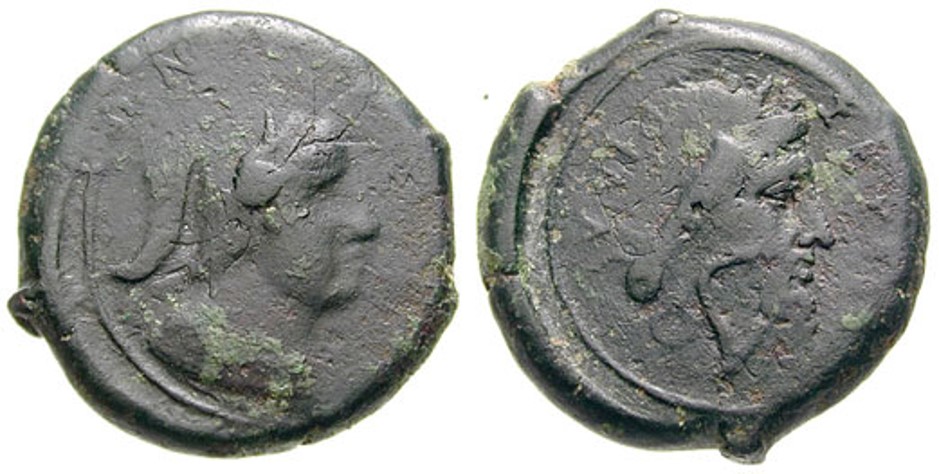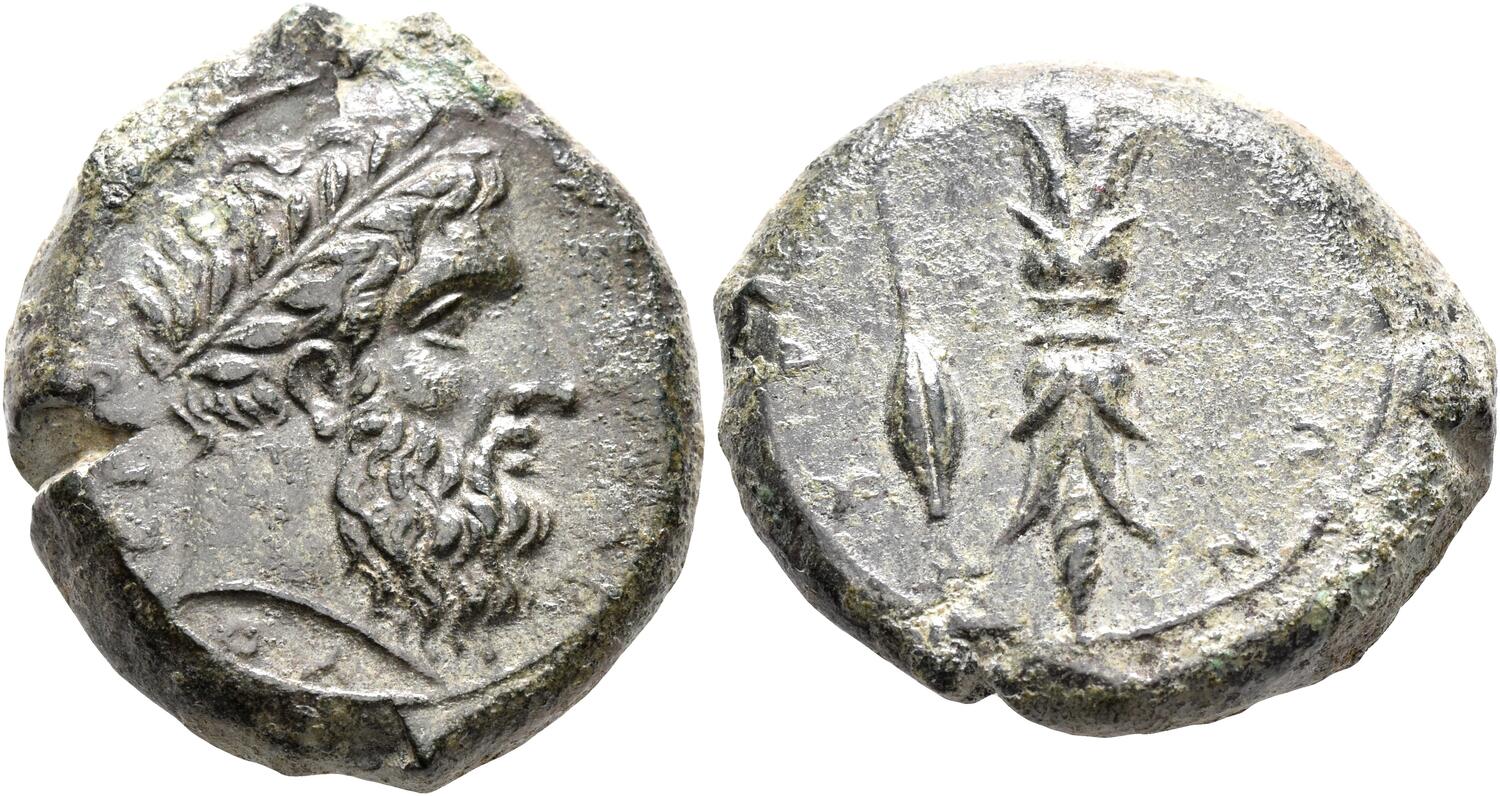2188 - Agyrium (AE Athena/bow & quiver) over Syracuse (Zeus/thunderbolt) (Triton, V, Jan. 2002, 116): Difference between revisions
From SILVER
No edit summary |
|||
| Line 5: | Line 5: | ||
|Sale=Classical Numismatic Group, 15 Jan. 2002, 116 = Peus, 407, 7 Nov. 2012, 148 | |Sale=Classical Numismatic Group, 15 Jan. 2002, 116 = Peus, 407, 7 Nov. 2012, 148 | ||
|Obverse description=Head of Athena right, wearing Attic helmet, within linear border. | |Obverse description=Head of Athena right, wearing Attic helmet, within linear border. | ||
|Reverse legend= | |Reverse legend=ΑΓΥΡΙΝΑΙΟΝ | ||
|Reverse legend language=Greek | |Reverse legend language=Greek | ||
|Reverse description=Bow and club or quiver | |Reverse description=Bow and club or quiver | ||
Latest revision as of 10:44, 25 November 2023
317 BCE - 280 BCE | ΑΓΥΡΙΝΑΙΟΝ
Images
Overstriking coin

Agyrium 1582 Triton.jpg [1]
Location/history
| Sale(s)Sale(s) ᵖ: | Classical Numismatic Group, 15 Jan. 2002, 116 = Peus, 407, 7 Nov. 2012, 148 | |
Overstriking coin
Description
| ObverseInscription or printing placed on the obverse.: | Head of Athena right, wearing Attic helmet, within linear border. | ReverseInscription or printing placed on the reverse.: | ΑΓΥΡΙΝΑΙΟΝ (Greek) Bow and club or quiver |
Mint and issuing power
| MintIdentifies the place of manufacture or issue of a numismatic object.: | Agyrium | Ancient regionAncient region. | Sicily | Modern countryModern country: Italy | AuthorityIdentifies the issuing power. The authority can be "pretended" when the name or the portrait of X is on the coin but he/she was not the issuing power. It can also be "uncertain" when there is no mention of X on the coin but he/she was the issuing power according to the historical sources: |
Chronology
| FromIdentifies the initial date in a range assigned in a numismatic context. 317 BCE toIdentifies the final date in a range assigned in a numismatic context.. 280 BCE | Hellenistic 323-30 BC |
Physical description
| MetalThe physical material (usually metal) from which an object is made.: Bronze |
WeightWeight of the numismatic object (in grams). in grams: 15.3115.31 g <br />15,310 mg <br /> | DenominationTerm indicating the value of a numismatic object. Examples: tetradrachm, chalkous, denarius.: hemidrachm |
|
References
| Coin referenceReference of the Coin: | Coin series referenceReference to coin series study: | Calciati 19871Calciati 1987, p. 134-135, n° 19, HGC 22HGC 2, n° 52 | |
| Coin series web referenceCoin series web references: | |||
Overstruck type
Description
| ObverseInscription or printing placed on the obverse.: | ΙΕΥΣ ΕΛΕΥΘΕΡΙΟΣ (Greek) Laureate head of Zeus Eleutherios right (visible on reverse). | ReverseInscription or printing placed on the reverse.: | ΣΥΡΑΚΟΣΙΩΝ (Greek) Thunderbolt |
Mint and issuing power
| MintIdentifies the place of manufacture or issue of a numismatic object. ᵖ: | Syracuse | Ancient regionAncient region. ᵖ | Sicily | Modern countryModern country: Italy | AuthorityIdentifies the authority in whose name (explicitly or implicitly) a numismatic object was issued. ᵖ: | Timoleon of Corinth (411-337 BCE), Timoleontic symmachy coinage |
Chronology
| FromIdentifies the initial date in a range assigned in a numismatic context. 357 BCE toIdentifies the final date in a range assigned in a numismatic context.. 344 BCE | Classical 480-323 BC |
Physical description
| DenominationTerm indicating the value of a numismatic object. Examples: tetradrachm, chalkous, denarius. ᵖ: | hemidrachm |
References
| Coin type referenceReference to coin series study ᵖ: | Calciati 19863Calciati 1986, p. 167, n° 72, HGC 22HGC 2, n° 1440 | ||
| Coin series web reference overstruckCoin series web references overstruck: | |||
Additional data
| Frequency of overstrikesFrequency of overstrikes: | frequent | Level of confidenceLevel of confidence of the identification: | strong |
| RemarksRemarks: | "Überprägung eines syrakusanischen Bronze-Hemilitrons des Dion" | ||
